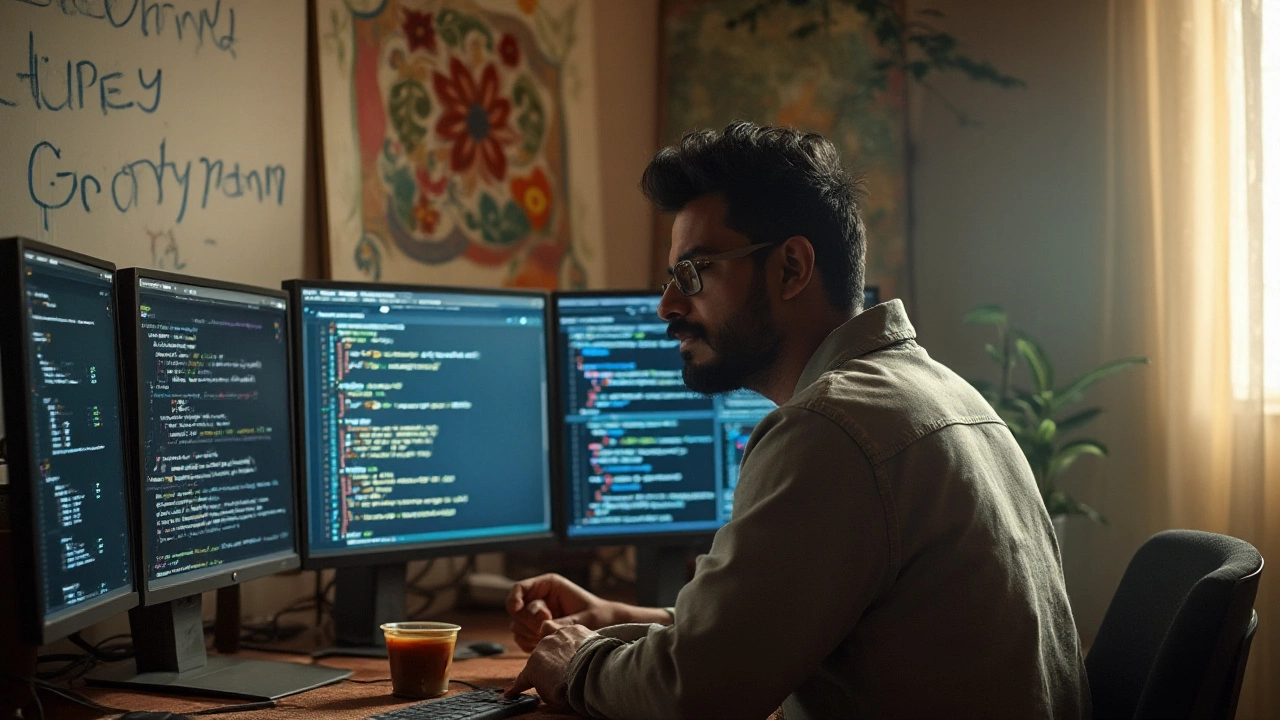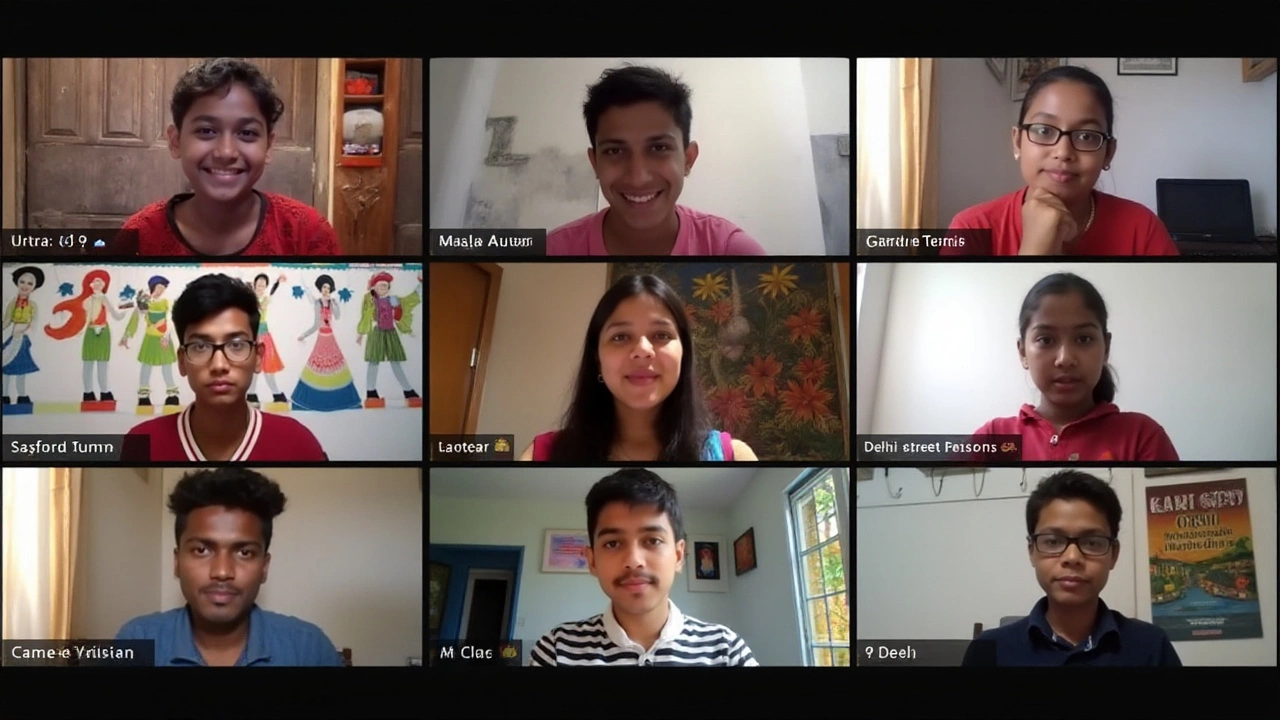In today's digital age, the idea of mastering programming from the comfort of your own home is no longer just a dream. With countless resources available online, anyone with an internet connection can embark on a coding journey that suits their pace and interests.
From interactive tutorials to engaging video lessons, the world of coding is at your fingertips. This approach allows you to tailor your learning experience and dive into tech's diverse and exciting landscape.
But how do you start? What do you need to keep the momentum going? Here, we will explore valuable insights and tools that can guide you on your path to becoming a self-taught programmer.
- Why Choose to Learn Programming at Home
- Essential Resources for Learning
- Tips for Staying Motivated
- Building Real-World Projects
- Connecting with the Coding Community
Why Choose to Learn Programming at Home
The digital revolution has opened up a world of opportunities, and learning programming at home is at the forefront of this change. One of the most significant advantages of learning programming at home is the flexibility it offers. Gone are the days when learning required a rigid classroom schedule. Now, you can tailor your study hours according to your personal commitments, whether it’s in the early hours of the morning or late at night. This flexibility is especially beneficial for working professionals and students who can balance coding with other responsibilities. Additionally, the variety of learning content available means you can choose exactly what languages or skills you wish to develop, be it Python, JavaScript, or data structures.
A compelling reason to embark on this journey from home is the vast array of accessible resources. You have the freedom to cherry-pick your learning materials from a wide range of platforms. Websites like Codecademy and Coursera offer comprehensive courses that cater to different levels of expertise. Meanwhile, YouTube channels and blogs provide supplementary tutorials and nuggets of wisdom that can boost understanding. By self-studying, you’re not bounded by a one-size-fits-all curriculum; you are in charge. Programming at home also tends to be more cost-effective. Online courses and open-source materials often come at a fraction of the price of traditional education, with some available completely free of charge.
"The ability to learn programming from home empowers individuals like never before, giving access to knowledge that was once reachable only by a few," says Sonia Stevens, a leading educational technologist.
Diving into the coding world from your living room can also provide an excellent opportunity to develop self-discipline and independent problem-solving skills. Without the typical classroom structure to fall back on, learners are encouraged to think critically and independently, fostering a sense of confidence and self-reliance. Additionally, the personal environment often stimulates creative thinking – a valuable asset in the tech field. As more companies endorse remote work, learning coding in the same setting might prepare you mentally for future job scenarios, giving you an edge in adapting to remote job demands.
Finally, learning at home allows for immediate application of your skills. Whether you're experimenting with personal projects or contributing to open-source platforms, the gap between learning and real-world application narrows significantly, helping to solidify your understanding. The freedom to explore and apply your new knowledge in real-time can propel your confidence and skill set forward at an accelerated pace. Whether you end up extending your hobby into a career or simply enjoy the satisfaction of creating something from scratch, the journey is as rewarding as the destination itself. These, among many other reasons, illustrate why more individuals are choosing to learn programming at home, making it a viable and attractive option in today’s digital era.
Essential Resources for Learning
When embarking on the journey to learn programming at home, the first step is to identify essential resources that will guide your learning process. The internet is a treasure trove of potential, with a vast array of platforms and tools designed to cater to all skill levels, budgets, and learning preferences. Whether you're completely new to coding or looking to expand your skill set, the right resources can make all the difference in your learning experience. One of the first places to look is online courses, which are accessible and often come with robust community support. Websites like Coursera, edX, and Udacity offer both free and paid courses from reputable universities. These platforms provide structured learning paths with video lectures, quizzes, and peer-reviewed assignments. They cater to different levels, from beginner introductions to advanced specializations.
Books still hold immense value in the digital age, offering in-depth knowledge and unique insights into coding. Titles such as "The Pragmatic Programmer" and "Clean Code" are considered classics, offering not just programming knowledge but wisdom on coding philosophy and best practices. As you delve into these books, you'll find that they provide a timeless perspective on programming that enhances online learning. Another aspect to consider is community engagement, which can be incredibly supportive as you learn coding online. Platforms like Stack Overflow are invaluable for real-time problem-solving, while Reddit’s programming subreddits provide a space for discussions and advice that can enrich your learning journey. Engaging with others helps to broaden one’s understanding and offers different viewpoints and solutions to coding challenges.
In today's tech-driven world, MOOCs (Massive Open Online Courses) have gained immense popularity due to their accessible nature. Universities and organizations offer these courses online, and they often come with peer support forums where learners can interact, solve problems, and network. Not to mention, many of these courses are either free or require a nominal fee. Codecademy is a go-to for beginners, offering hands-on coding practice in an interactive environment. This approach is perfect for those who learn by doing, as it simulates real-world coding tasks and offers immediate feedback. Self-study programming requires dedication, and sometimes it’s easy to lose motivation. Online platforms like Khan Academy and FreeCodeCamp offer gamified learning experiences, making it enjoyable to progress through various coding exercises.
Finally, let's not overlook the importance of project-based learning, which can be a game changer. Websites like GitHub provide a platform not just for code storage but also for collaboration on open-source projects. As a learner, contributing to an open-source project can offer hands-on experience and exposure to collaborative coding, which is crucial in real-world scenarios. By building projects, learners can apply what they've learned in theory to actual problems, reinforcing their understanding and skill set. In the words of Steve Jobs,
"Everyone in this country should learn how to program a computer because it teaches you how to think."This quote underscores the importance of leveraging all available resources to foster a comprehensive understanding of programming, which in turn fosters problem-solving skills and ingenuity.

Tips for Staying Motivated
Learning to code can be an exciting yet challenging adventure. As you embark on the journey to learn programming at home, maintaining motivation is crucial. One of the first steps is setting a clear goal. Why do you want to learn to code? Whether it's to switch careers, build an app, or simply understand technology better, having a purpose will fuel your progress. Write your goals down and place them where you can see them daily. Visual reminders of why you're learning can be incredibly powerful in keeping you on track when the going gets tough.
“Motivation is what gets you started. Habit is what keeps you going.” – Jim Ryun
Creating a structured learning schedule is another effective way to stay on track. Just like any other skill, learning programming at home requires discipline. Designate specific hours each week for coding and stick to your schedule as much as possible. Consistency is key. Consider joining online coding groups or forums, where you can share your journey with others and stay motivated through community support. It’s often easier to keep going when you know others are pursuing similar goals alongside you. Surrounding yourself with like-minded individuals can provide a sense of camaraderie and shared purpose.
Another tip is to celebrate small victories. Programming can often feel like a colossal mountain to climb, and it's easy to overlook how much you've accomplished along the way. Break your learning into small, manageable goals and celebrate when you achieve each one. This might be as simple as writing your first line of code or completing a challenging project. Recognizing these victories will boost your confidence and motivate you to keep pushing forward. Also, don't hesitate to reward yourself for reaching these milestones. Perhaps treat yourself to something special as a way to reinforce your positive momentum.
Consider incorporating various learning methods to keep things engaging. Mixing video tutorials, reading articles, and interactive coding exercises can prevent monotony. Platforms like Codecademy, Khan Academy, and Coursera offer diverse methods to learn coding online, ensuring that learning doesn't become stale. Tailoring your approach to suit your learning style can significantly improve retention and enjoyment. If you're more hands-on, try building small projects as you learn, applying theoretical knowledge in practical scenarios. This not only solidifies your understanding but makes learning feel more relevant and immediately rewarding.
Finally, remember that setbacks are part of the learning process. It's normal to encounter problems and feel frustrated along the way. When you hit roadblocks, take a break, and return with a fresh mind. Reinforce your resilience by reminding yourself of past challenges you've overcome. These experiences build character and equip you with problem-solving skills that are invaluable in coding and beyond. Stay curious, and embrace the learning curve in self-study programming. Persistence is everything in the coding world, and your commitment will pay off in ways you might not even foresee yet.
Building Real-World Projects
Embarking on creating real-world projects is one of the most effective ways to solidify your programming knowledge. Tackling such projects helps bring abstract concepts to life, offering a tangible way to see your coding skills at work. Whether you're programming a simple to-do app or developing a complex online platform, the lessons learned in building these real-world projects are invaluable. The process not only improves your coding ability but also gives a deeper understanding of problem-solving, user interaction, and system design. Projects serve as an opportunity to put theory into practice, turning lines of code into functioning applications, which is both rewarding and educational.
One essential tip for working on real-world projects is to start small. Choose projects that excite you, yet don't seem daunting. Perhaps it could be a simple game, an interactive website, or an automation script that solves a problem you've noticed in your life. It's crucial because starting with a manageable project can prevent burnout, while also providing the dopamine hits needed to keep motivated. Once you get comfortable with the basics, you can move on to larger projects that challenge your abilities further, pushing you to learn more advanced concepts. This iterative approach helps build confidence alongside skills.
Connecting with actual users during the development phase can offer valuable insights into how your project is viewed outside of the bubble you're working in. Feedback from others can highlight usability issues you might overlook and features that could enhance the user experience. This interaction often leads to smarter design choices and ultimately enhances your project's viability. Moreover, sharing your work with the community, either by open-sourcing the code or demonstrating it online, brings fresh perspectives and sometimes unexpected solutions provided by peers.
A great real-world project does more than act as a learning tool; it also becomes an impressive showcase for potential employers or clients. Compiling a portfolio of your projects can demonstrate your skills, creativity, and dedication effectively. Many companies and recruiters place a heavy emphasis on real-world applications rather than academic qualifications alone. Today, many people utilize platforms like GitHub for this very purpose, systematically updating their profiles with project descriptions, code samples, and relevant documentation.
Lastly, incorporating feedback loops into your project builds a keystone habit for successful self-study programming. By testing and iterating on your project constantly, not only do you refine your work, but you also inherently refine your skills as a programmer. This way, each completed project is not an endpoint, but a stepping stone enhancing your journey of learning programming at home. As Leonardo da Vinci said, "Art is never finished, only abandoned." This sentiment holds for coding, where a project progresses constantly with new learnings and advancements.

Connecting with the Coding Community
One of the most fulfilling aspects of learning programming at home is the opportunity to connect with a vibrant, global community of fellow enthusiasts and professionals. This virtual support network plays a pivotal role in enriching your learning experience and sustaining motivation. Engaging with others who share your interests fosters a sense of belonging, providing encouragement during challenging phases of your learning journey. Online forums and platforms like Stack Overflow, GitHub, and Reddit are teeming with discussions where seasoned developers and novices alike exchange tips, solve problems, and collaborate on projects.
Reddit's programming boards, for example, host daily threads where you can seek feedback on your code or even just get an understanding of industry trends. Meanwhile, GitHub allows you to contribute to open-source projects that give real-world context to your learning. Collaboration on open-source projects is more than just a practice ground for your skills; it can significantly boost your visibility in the programming community. Apart from platforms, joining social media groups on LinkedIn and Twitter can also keep you updated with technological advancements while providing insights into career opportunities.
Beyond these platforms, the value of meetups and virtual coding events cannot be underestimated. Websites like Meetup.com frequently list virtual meetings and hackathons where developers gather to share ideas and work on challenges together. These venues offer the chance to network with industry professionals, granting you exposure to diverse perspectives and emerging developments in the tech field. In many ways, the relationships you build here can significantly influence your coding career, providing mentorship opportunities and even potential collaborations.
As tech thought leader Linus Torvalds once said,
"The fact that I personally don't experience the music any differently doesn't mean a lot. It's the community reaction that gives it its value."The sentiment holds true in coding where collaboration and community drive innovation and learning. By participating in community activities, you not merely foster your personal growth; you're contributing back to the ecosystem that nurtures many more aspiring developers.
Moreover, engaging in community discussions often exposes you to new libraries, frameworks, and tools that you might not discover on your own. Participating in challenges on websites like LeetCode or Codewars can further stimulate your problem-solving skills while engaging in friendly competition with peers. These challenges bring an element of gamification into learning, which is both motivating and educational. Looking at data from a recent survey, individuals who regularly participated in community learning platforms reported higher satisfaction and skill improvement rates compared to those who didn't. Networking within these digital spheres can open doors to jobs, internships, and collaborative ventures, vital for anyone serious about making coding a central part of their career.
